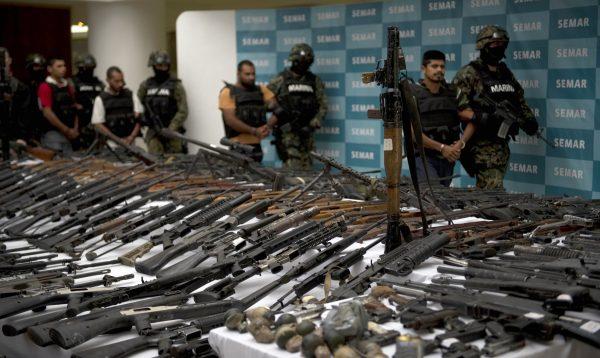Sen. Ted Cruz (R-Texas) and 26 other federal lawmakers are urging the U.S. Supreme Court to review Mexico’s lawsuit against U.S. gun makers for allegedly flooding their country with firearms.
Among the other lawmakers are Sens. Lindsey Graham (R-S.C.), Rick Scott (R-Fla.), and John Thune R-(S.D.), as well as Reps. Darrell Issa (R-Calif.), Clay Higgins (R-La.), and Anna Paulina Luna (R-Fla.).
Gun rights advocates say Mexico’s lawsuit is exploiting U.S. laws in an effort to cripple the U.S. firearms industry and weaken the Second Amendment protections enjoyed by Americans.
“Mexico’s lawsuit is an affront to the sovereignty of the United States of America,” the lawmakers’ brief states.
“It has no place in federal court, and it attempts to dragoon American courts to subvert the policy determinations of the political branches of the U.S. Government,” it added. Mexico is attempting “to impose its view of law, the right to bear arms, and liability protection on the American people.”
On Sept. 30, 2022, U.S. District Judge F. Dennis Saylor IV in Massachusetts threw out a $10 billion lawsuit that Mexico brought against arms makers, including Smith & Wesson, which alleged that U.S. companies were deliberately undermining Mexico’s gun laws by making “military-style assault weapons” that found their way to drug cartels and criminals. Judge Saylor was appointed in 2004 by President George W. Bush.
Judge Saylor found that the federal Protection of Lawful Commerce in Arms Act (PLCAA) of 2005 “unequivocally bars lawsuits seeking to hold gun manufacturers responsible for the acts of individuals using guns for their intended purpose.” The PLCAA was enacted to protect the industry from frivolous lawsuits filed against businesses related to crimes that they didn’t commit.
But in January of this year, a three-judge panel of the U.S. Court of Appeals for the 1st Circuit overturned the dismissal, remanding the case to the district court and allowing the lawsuit to proceed.
Judge Kayatta was appointed in 2013 by President Barack Obama.

In its opinion, the 1st Circuit pointed at the U.S. firearms industry. Despite tough laws that make it “virtually impossible” for criminals to obtain guns lawfully in Mexico, the country has the third-highest number of gun-related deaths in the world, rising from fewer than 2,500 in 2003 to about 23,000 in 2019, Judge Kayatta wrote.
The rise in gun violence “correlates” with the boost in gun production in the United States that began with the end of U.S. assault weapon ban in 2004. Mexico alleges that illegal gun trafficking into their country was motivated largely by Mexican drug cartels’ demands for military-style weapons.
“For example, Mexico claims that between 70 and 90 percent of the guns recovered at crime scenes in Mexico were trafficked into the country from the United States,” the judge wrote.
In this “gun-violence epidemic,” Mexico has had to pay the cost of additional medical, mental health, increased law enforcement, diminished property values, and decreased revenues from business investment and economic activity. The firearms companies produce more than 68 percent of U.S. guns that find their way to Mexico, or between 342,000 and 597,000 guns each year, he wrote.
Mexico claims the companies know their guns are trafficked into Mexico “and make deliberate design, marketing, and distribution choices to retain and grow that illegal market and the substantial profits that it produces.” Mexico argues the companies design their firearms as military-style weapons knowing the drug cartels want such weapons, the judge wrote.
In the Cruz brief, the lawmakers argue that Mexico has overreached.
The principle of comity, or the recognition that one nation gives domestically to the official acts of another nation, allows a foreign nation to pursue claims in U.S. courts on the same footing as a domestic person. This means Mexico may pursue “firearm manufacturers to the same extent that a U.S. citizen could, but no more,” the lawmakers said.
But they added that Mexico is wrong to argue that it is entitled to sue under the PLCAA because that statute “reaches as far as each district court’s jurisdiction, and prevents it at every turn.”
The theory of liability that Mexico is arguing “contradicts the clear and unambiguous language of PLCAA precluding that liability,” and the district court recognized this when it dismissed the lawsuit, the brief states.
“The district court properly rejected Mexico’s arguments: that because its alleged injuries occurred outside the United States and because it is a foreign-sovereign plaintiff, PLCAA was categorically inapplicable to this lawsuit.”
The Supreme Court should grant the gun companies’ petition and “reject Mexico’s spurious argument that PLCAA is categorically inapplicable[.]”
“Mexico’s lawsuit thus disrespects the U.S. Constitution and U.S. law. While Mexico may not place much stock in the Second Amendment, the right to keep and bear arms is fundamental to our scheme of ordered liberty,” the brief states.
The Epoch Times has reached out to the attorney of record for Mexico, Cate Stetson of Hogan Lovells US LLP in Washington for comment but had not received a reply as of press time.
It is unclear when the court will consider the petition.
